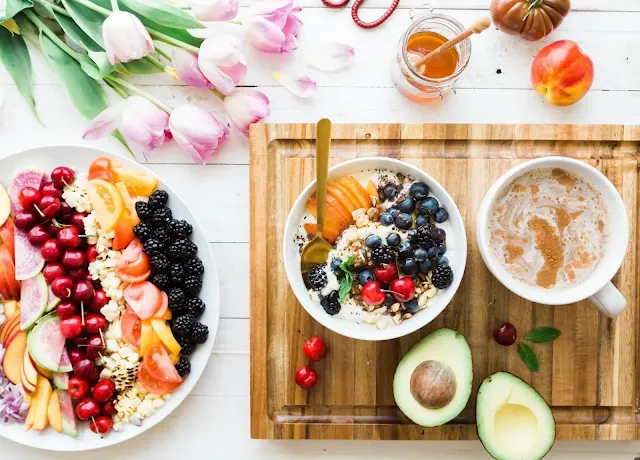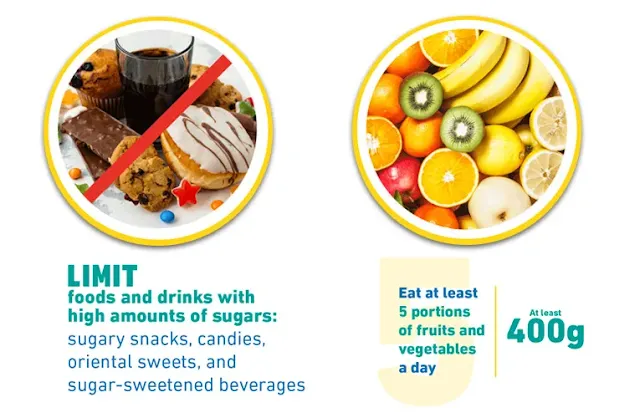To improve your healthy diet, you need to eat healthier foods. You should avoid foods that are high in fats and sugar. You should also limit the amount of red meat and sugar in your diet. You can also try to eat smaller portions and less salt. These steps can improve your health and prevent diseases.
Reduce fats, red meat, and sugar in your diet
If you are concerned about your health, you should reduce your consumption of red meat and fats. They contain high amounts of saturated fat, which is linked to an increased risk of heart disease and diabetes. Some of these saturated fats are natural, such as the saturated fat in milk, butter, and cheese, but others are added to foods like potato chips and baked goods. If you want to avoid the high consumption of saturated fat, you should switch to lower-fat dairy products. Moreover, you should choose meat cuts that contain less fat. It is also important to check nutrition labels.
In addition to avoiding red meat, you should also minimize your consumption of processed meat and fats. Avoid foods that contain trans fats, which are unhealthy fats. Look for products with omega-3 fatty acids, which help protect your heart and fight inflammation. You should also look for foods that contain omega-6 fats, which help build healthy cells and nerve fibers.
Certain cuts of red meat are high in saturated fat and can raise your cholesterol levels. Instead, choose to eat less red meat if you enjoy a varied and healthy diet rich in plant foods.
Eat a variety of healthy Diet foods
Trying to eat a variety of foods is a great way to keep your body balanced and prevent chronic diseases. Choosing foods that contain a variety of nutrients is also a great way to keep your meals interesting. You can even include foods that do not fit into the five food groups. These foods are known as discretionary foods and should be eaten in moderation.
Protein is another important element of your diet. Choosing grass-fed meats is a good way to make sure that your body is getting the amino acids that it needs. Low-fat dairy products are also a great choice. Other good sources of protein include nuts, legumes, and whole grains.
Trying to eat more fruit and vegetables is another way to eat more nutrients. Fruits are rich in vitamins and minerals and contain few calories. Consuming more of these foods can prevent chronic diseases such as diabetes, heart disease, and colon cancer. These foods also have a lower calorie content than those that are high in fat.
Vegetables are another good source of fiber. You can find numerous ways to prepare fruits and vegetables. You can even prepare meals from them. For instance, a simple bowl of steamed or roasted broccoli can be a healthy option.
Reduce salt in your diet if you have high blood pressure
Cutting out salt from your diet is one of the easiest things you can do to lower your blood pressure. It can have dramatic effects within weeks. Eating too much salt is linked to cardiovascular diseases and kidney disease. It can also increase the risk of stroke and dementia. Your kidneys filter out fluid and control your blood pressure, so a diet high in salt may lead to problems with these organs.
Salt is essential for heart and nerve function, but too much of it can lead to high blood pressure and other heart diseases. Foods high in salt include meat, crackers, frozen meals, salad dressings, steak sauce, soups, breads, and pickles. You should also avoid processed foods and cheese.
In addition to table salt, you should also avoid hidden salt, which accounts for about 75% of the sodium you consume each day. Look for products that are labelled salt reduced or 'no added salt' to lower your sodium intake. You should also check the label of the foods you buy to find out how much sodium is in each 100g serving. Look for products with less than 120 mg of sodium per 100g. You should also look for reduced salt bread and lower sodium canned vegetables. Fresh wholefoods are also a great way to cut back on sodium in your diet.
The American Heart Association recommends that the average person limit their sodium intake to 1,500 mg per day. This recommendation is supported by the Centers For Disease Control (CDC). Studies have shown that people with high blood pressure benefit from limiting their sodium intake. And the more you limit salt, the more your blood pressure will decrease.
Take smaller portions
Eating smaller portions is a great way to curb cravings and reduce your calorie intake. You'll find that your eating patterns will change when you're able to feel satisfied before you reach for more food. In addition to reducing the number of servings, taking smaller portions can help you learn how to train your brain to recognize healthy portions.
Many people overeat because their portions are large. A portion is the amount of food you eat in a single setting. When eating in a restaurant, make sure to look at the portion size. This will allow you to choose the proper portion size and eat fewer portions of more fatty or high-calorie foods.
Eating large portions can also cause indigestion and digestive discomfort. Eating smaller portions can eliminate bloating and cramping after meals. Additionally, overeating can lead to blood sugar imbalance and insulin resistance. Eating smaller portions will help you feel more satisfied after meals, and it will also help you lose weight.
Another way to control your portions is to read the labels on the food. Look for hidden calories, and be sure to read the serving sizes. If possible, use small serving dishes to eat from. Also, don't leave leftover food on your plate. Instead, store leftovers in single-serving containers.
Eat a plant-based diet
There are many benefits to eating a plant-based diet. Plants are rich in phytochemicals and essential nutrients. These compounds help keep our cells healthy and our immune systems strong. You can find them in fruits, nuts, seeds, and vegetables. You can also add plant-based protein to your daily diet.
While many people may feel that plant-based diets are low in nutrients, they're actually beneficial for your health. The key is to eat a variety of plant-based foods to get all the nutrients you need. This way, you'll be less likely to develop nutritional deficiencies. Protein is an essential part of any diet, and plant-based sources of protein can provide the amino acids your body needs.
A plant-based diet also lowers your risk of many diseases. It contains plenty of fiber, which keeps you feeling full longer and prevents mid-morning snack cravings. It also limits unhealthy fats, such as saturated and trans fats. Studies have also shown that a plant-based diet reduces body weight, which equates to a healthier heart and a lower risk of heart disease.
A plant-based diet is easy to implement and doesn't mean you have to give up all of your favorite foods. Simply switch out the unhealthy ingredients with healthier ones. For example, instead of buying a frozen burger patty, make a portobello burger instead. Similarly, a homemade froyo can be made with dairy-free milk. Making meals and snacks interesting can make eating a plant-based diet enjoyable and rewarding.
Reduce trans fats in your diet
Trans fats are a huge problem for the heart and other health issues. These industrial fats mimic the behaviour of saturated fats in the body and raise LDL cholesterol while reducing HDL (good) cholesterol. Unfortunately, trans fats are highly prevalent in our food supply and are one of the leading causes of cardiovascular disease. They are found in many packaged foods and even some margarines. Therefore, it's important to read food labels carefully. You should always choose foods that contain low levels of trans fats.
One of the best ways to reduce your trans fat intake is to cut down on processed food. Try to avoid fried fast foods, snack foods, and commercially prepared baked goods. You should also try to eat more whole grains and vegetables instead. And make an effort to replace trans fats in your diet with healthier fats. For example, instead of using partially hydrogenated oil, you should choose olive oil, canola oil, and liquid vegetable oils. You can also switch to using butter instead of oil in cooking. Also, avoid eating deep-fried foods. Many restaurants use partially hydrogenated oils in their fryers.
In addition to avoiding trans fats, you should also limit the use of stick margarine and shortening in your daily diet. Instead of these, use olive oil or pecan oil for sauteing, or canola oil for salad dressing. For more information on reducing trans fats in your diet, visit Health Tips Mentor.



